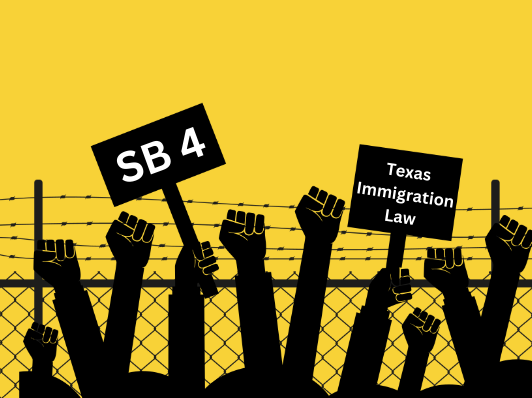The Israel-Palestine Conflict Displays The Rarity of Balanced News Coverage
Although the Middle East is no stranger to war, the Israli-Palestinian conflict may be one of the most controversial and ongoing battles that the region suffers from. This strain isn’t helped by its inception dating back to 1949, making it one of the Middle East’s longest-running conflicts. Fighting mainly takes place between various Palestinian militant groups, including Hamas and the PIJ, with Israeli forces. However, the military of Palestine (PLA) has clashed with Israel as well. The conflict takes place largely on the ground in the East and West Banks, but some of the most significant back-and-forths between militants and Israeli forces have been airstrikes the two sides have been exchanging for decades.
Unfortunately, the war has blurred the line between soldiers and citizens as Israeli soldiers have been reported to confront terrorist militants, angry protesters, and random passersby in the same manner. Palestinian deaths this year have risen above a hundred, while at the same time, about 29 Israelis were killed by Palestinians. Suicide bombers, rocket strikes, and other military operations have all contributed to the deaths.
As you might know, these violent attacks receive extensive news coverage. If you scan many headlines of major news sources like the BBC, you’ll find mentions of Israel or Palestine. But reporting evenly on conflict, especially on such a long-running and politicized battle as the Israel-Palestine situation, is difficult. For instance, the conflict sees many unfortunate “he-said-she-said” scenarios where a group of villagers tells an entirely different story than a company of soldiers. Both sides have also engaged in questionable tactics, from the Israeli destruction of Palestinian homes to the indiscriminate carpet-rocketing of Israeli cities by Palestinian militant groups.
This makes reporting very hard because no action in the region comes without years of painful background, and neither side can boast clean hands. So when trying to report objectively, reporters face a slew of problems. For one thing, language is critically important. An example: “Israel strikes West Bank with artillery strike response” has a much different effect on newsreaders than “Israel strikes West Bank with artillery strike retaliation.” That’s merely a one-word difference.
Imagine these two equally true headlines: “Israeli airstrike massacres innocent children at school” and “Israeli airstrike targeting a terrorist cell accidentally lands during school hours.” Here, the dilemma of truth arises. Both hypothetical headlines just listed were true: they both contained exclusively facts about a real situation. But it’s clear that the headlines are each leading their reader to a different conclusion about the same event. Perhaps even more dangerous than loaded language is the invisible mark of media bias: under coverage. When a news source decides not to publish a story on any event, they (intentionally or unintentionally) lower the public consciousness about the event. This obviously, changes public opinion. So media companies can create a large difference in public opinion by literally doing nothing at all.
The point here is that unbiased reporting is hard, really hard. If even one editor or journalist (and a company like the BBC will employ scores of them) selects a few particular words or decides not to publish an article, accusations of bias may quickly flood in. And sometimes, these accusations are valid. As weird as it seems, a news source can be biased against both sides of a conflict, because each reporter is a different person with different biases.
Somewhat comedically, the BBC in particular has actually been accused of being biased in the favor of Israel by some reports but has also been accused of favoring Palestine by others. Various independent and non-independent groups have brought forward these accusations, so it’s hard to doubt that some of them are finding real bias. The question is though, are they finding an exclusive, one-sided bias? It’s certainly possible for a news source to be biased to one side only (just take a look at CNN or Fox News), but many news sources actually provide coverage that sometimes over-favors both sides. This is often done through the subject of the favor changing from article to article. In fact, this usually occurs unintentionally. Reporters and editors, just like us, are people who have biases and make mistakes. It makes sense that bias slips into the process, and for more balanced news sources, these slips can favor both sides.
Reporters and editors, just like us, are people who have biases and make mistakes.
— Baker Tuthill
If you’re still unsure about this idea of a news source having a both-sided bias, let’s take a look at some coverage of the Israel-Palestine conflict by examining the BBC. A recent headline from Nov. 18 reads “Autistic teen’s killing casts spotlight on Israeli tactics.” The image for the article is a photo, possibly from a family’s social media account, with a broken heart emoji next to a young teen. The headline and picture evoke the image of a beloved, innocent teen being mercilessly killed by “Israeli tactics.”
Yet, just five days later, an article titled “Rare bomb attack at Jeruselum bus stop kills teen,” was published on the website. Unlike the coverage of the Palestinian teen’s death, the Israeli teen’s death was called a “rare” incident, despite frequent killings and bombings in Israel. This certainly the title did not mention “Palestinian tactics” or “terrorist tactics.”
So at face value, the BBC seems like an Anti-Israel source. However, earlier in the year on Sept. 23, the article “Palestinian Anger at Possible U.K. Embassy move,” showed a happy picture of Israeli Prime Minister (PM) Yair Lapid meeting with former U.K. PM Liz Truss in front of the flags of both nations. This might evoke a positive feeling around U.K.-Israel relations instead of drawing attention to the Palestinian perspective in question.
On Aug. 17, an article showed the shortened title (seen before opening the article) of “Palestinian President’s Holocaust Claims Condemned.” Although only Israel and Germany had condemned this claim at the time, this shortened title makes the claims seem widely condemned. So language bias isn’t as black and white as it may seem at first, just like the very conflict being reported on. Individual editors and reporters have a huge influence on the outlook of the site as a whole, and a few articles with a bias one way or another can generate a huge controversy.
Balanced news coverage is such a delicate act that it’s very easy to mess up, especially in a place like Israel-Palestine where right and wrong are not so easily discerned. And in the face of such important issues facing the world, messing up with bias can massively affect the opinion of the often-impressionable public. The truth is that at the end of the day, even our most respected news sources are going to deal with media bias sometimes. And especially in the Israel-Palestine conflict, where reporters often have to cover “he-said-she-said” encounters where witnesses conflict, it can be very difficult to write a balanced story. That’s why, as readers of the news, it is critically important that we analyze everything that we read. You can do this by reading multiple news sources, examining articles for powerful or loaded language, and researching important context to reported events that may not be mentioned on some sites. And understanding that balanced reporting is extremely difficult will help you look at the news with a more critical eye.

Class of 2023
Hi! As a lifelong reader and writer, I am excited to join the Horizon team this school year. On the page, in the debate room, or on the...









